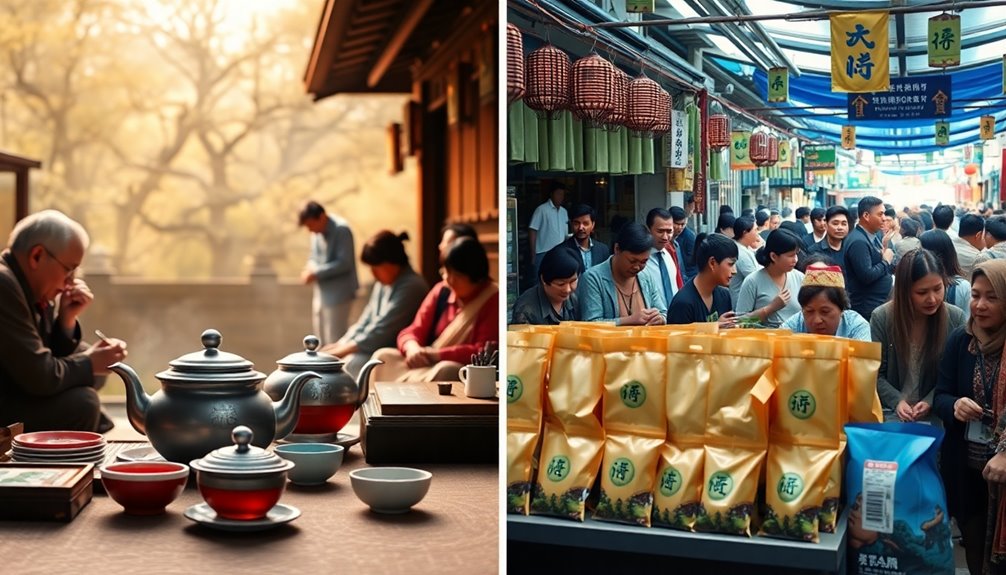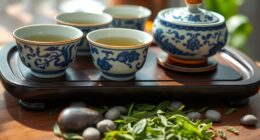The mythical legends around tea highlight its deep-rooted cultural and spiritual significance. You might find interesting the tale of Emperor Shen Nong, who discovered tea in 2737 BCE when leaves accidentally fell into his boiling water. Another fascinating story is about Bodhidharma, who introduced tea to China in 520 CE, using it to stay awake during meditation. These legends connect tea with health, mindfulness, and social bonding. They illustrate how tea rituals have evolved across cultures, enriching people's lives. Exploring these myths reveals even more about tea's lasting impact on society and wellness.
Key Takeaways
- Emperor Shen Nong is credited with discovering tea in 2737 BCE, initially using it for medicinal purposes before it became popular as a beverage.
- Indian legend attributes the introduction of tea to China to Bodhidharma in 520 CE, linking it to health and wellness.
- Bodhidharma's association with meditation emphasizes tea's spiritual significance and its role in enhancing focus during mindfulness practices.
- The spread of tea culture throughout Asia transformed social customs, particularly in Japan and Korea, embedding tea in communal rituals.
- Tea's historical significance is enriched by various cultural interpretations and myths, elevating its status as a symbol of peace and tranquility.
Introduction

Tea has woven itself into the fabric of cultures around the world, but its origins are steeped in myth and legend. The discovery of tea is often attributed to Emperor Shen Nong in 2737 BCE when he accidentally found its medicinal benefits after leaves fell into his boiling water. This serendipitous moment marked the beginning of tea's journey through Chinese culture, linking it to health and wellness.
Later, an Indian legend credits the Buddhist monk Bodhidharma with introducing tea to China in 520 CE. His connection to meditation and spiritual practice imbues tea with profound significance, suggesting that it aids in enlightenment and consciousness.
According to myth, Bodhidharma even cut off his eyelids to stay awake during meditation, which led to the first tea plants sprouting from them, further emphasizing tea's spiritual roots.
Bodhidharma's Meditation and Tea

Bodhidharma's legendary journey from India to China isn't just a tale of travel; it's a narrative that intertwines tea with the pursuit of spiritual awakening.
As a dedicated Buddhist monk, Bodhidharma faced the challenge of exhaustion during his long meditation sessions. To combat this, he resorted to chewing leaves from a wild tree, which many believe marked the beginnings of tea cultivation.
According to legend, Bodhidharma even cut off his eyelids to prevent himself from succumbing to sleep, with the first tea plants sprouting from where they fell. This myth highlights tea's spiritual significance, associating it with perseverance and mindfulness.
Among Buddhist monks, tea became an essential companion in their meditation practices, enhancing alertness and focus, vital for deep spiritual exploration.
The connection between tea and meditation permeated various cultures, reinforcing the idea that tea isn't just a beverage; it's a tool for achieving heightened states of awareness.
Thus, Bodhidharma's influence transcends mere legend, symbolizing the vital role tea plays in the spiritual journey of countless seekers.
Bodhidharma's Tea Leaf Discovery

The discovery of tea leaves during Bodhidharma's intense meditation sessions transformed not just his own practice but the spiritual landscape of China.
As the legend goes, Bodhidharma, an Indian Buddhist monk, experienced such exhaustion from his meditation that he cut off his eyelids to stay awake. From where they fell, tea plants are said to have sprouted, symbolizing the profound connection between tea and spiritual practices.
This tale emphasizes how tea enhances focus and awareness, crucial elements in meditation. For Zen monks, tea consumption became more than just a beverage; it was a ritual that reinforced Buddhist philosophy. The act of drinking tea encouraged mindfulness, allowing practitioners to immerse themselves fully in the present moment.
Over time, tea evolved into an integral part of Zen Buddhist rituals, reflecting its deep spiritual significance. Each sip not only nourished the body but also supported the quest for enlightenment.
Bodhidharma's discovery of tea leaves thus represents a pivotal moment, intertwining the essence of tea with the rich tradition of meditation, fostering a culture of awareness and presence that continues to thrive today.
Bodhidharma's Eye-Opening Experience

Meditation can lead to profound insights, and for Bodhidharma, it sparked an eye-opening experience that changed everything. As a dedicated Buddhist monk, you can imagine the intensity of his spiritual practice. During long hours of meditation, he faced overwhelming exhaustion.
To combat this, legend has it that Bodhidharma cut off his eyelids, a drastic act that symbolizes his commitment to mindfulness and alertness. From these discarded eyelids, tea plants are said to have sprouted, establishing a deep connection with nature and the spiritual essence of tea. This tale emphasizes the significance of tea in enhancing meditation, as the traditional tea ceremony promotes a state of calm and focus for practitioners.
For Bodhidharma and fellow monks, tea became vital for maintaining focus during prolonged contemplation. The practice of drinking tea intertwined with Buddhist rituals, transforming it from a simple beverage to an essential element of Zen tradition. The act of sipping tea fosters mindfulness, allowing practitioners to remain present and engaged in their spiritual journeys.
Interestingly, the unique aroma of brewed tea can create a calming environment, further enhancing the meditative experience for those seeking to deepen their practice. Bodhidharma's eye-opening experience not only influenced his life but also shaped tea culture, highlighting tea's revered status in both spiritual and communal life, extending far beyond the borders of China.
Cultural Misinterpretations of Tea

Tea holds a revered place in cultures around the world, but misunderstandings often cloud its rich history. The Chinese legend of Emperor Shen Nong, who discovered tea through an accidental infusion, frames it as a divine gift, highlighting the beverage's spiritual significance.
In Indian folklore, Bodhidharma's dramatic story, where he cut off his eyelids during meditation, adds a layer of mystique, making tea cultivation a spiritual practice. However, cultural misinterpretations frequently overlook tea's dual identity as both a medicinal remedy and a social beverage.
This is especially true in many cultures, where tea symbolizes hospitality and community bonding. The Japanese tea ceremony, deeply rooted in Zen Buddhism, is sometimes misrepresented as a mere aesthetic display rather than a profound ritual emphasizing mindfulness and connection with nature.
Such oversimplifications can lead to a diminished understanding of tea's historical significance, neglecting the intricate tapestry of myths and legends that elevate its esteemed status. By recognizing these cultural misinterpretations, you can gain a deeper appreciation for tea's role in fostering connection and understanding across diverse cultures.
Practical Applications

Understanding the rich myths surrounding tea enhances its practical applications in everyday life. The legendary discovery by Emperor Shen Nong in 2737 BCE underscores tea's initial role in health, as he recognized the benefits of the beverage after leaves fell into his boiling water. Incorporating tea into your routine can also be supported by the use of aromatherapy oils, which can enhance relaxation and well-being. Essential oils for mental clarity can also complement your tea experience by promoting focus and mood elevation. Additionally, using essential oils for respiratory health can further improve your overall well-being while enjoying tea.
Today, you can harness these health benefits by incorporating tea into your daily routine, whether you choose traditional varieties from China or spiced chai from India.
Tea's connection to meditation and mindfulness is equally significant. Inspired by Bodhidharma's tale, you might find that sipping tea during meditation enhances your focus and calmness. Using essential oils like lavender can create a calming atmosphere that complements your tea experience.
The cultivation of tea plants has shaped not just agriculture but also the culture of tea itself, influencing social practices worldwide.
In Japan, the Zen-inspired tea ceremony symbolizes mindfulness, offering a serene experience that's perfect for reflection.
You can adopt similar practices in your life, using tea to create moments of peace. By embracing these historical and cultural elements, you enrich your understanding and appreciation of tea, making it a versatile companion for health, meditation, and social gatherings. Additionally, incorporating aromatherapy techniques can further enhance your relaxation and mindfulness during tea moments.
Conclusion
In exploring the mythical legends surrounding tea, you discover a rich tapestry of spirituality and cultural significance. From Bodhidharma's transformative meditation to the eye-opening experience that followed, tea's origins are steeped in mystique. These stories not only deepen your appreciation for tea but also connect you to centuries of tradition. As you savor your next cup, remember the legends that bring it to life, enriching every sip with history and meaning.










